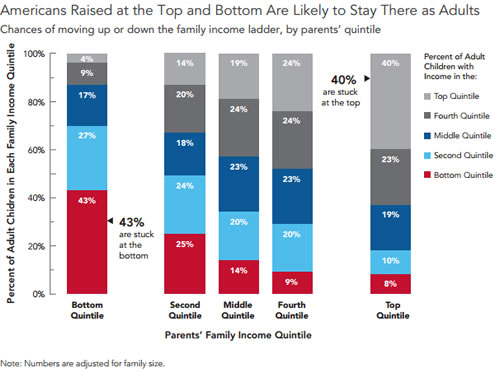
But is that reality? Analysis of intergenerational income and wealth by the Pew Center on the States revealed that even though most Americans have higher family income than their parents did, it's still tough to climb that economic ladder for some:
Pursuing the American Dream: Economic Mobility Across Generations, the latest research from The Pew Charitable Trusts, shows opportunity is not the same for everyone. While 84 percent of Americans have higher family incomes than their parents did at the same age, those born at the top and bottom of the income ladder are likely to stay there as adults.
"The ideal of the American Dream is complex and we see again that one’s ability to achieve it is impacted by race, education, and family background,” said Erin Currier, manager of Pew’s Economic Mobility Project.
Pursuing the American Dream uses the most current data to measure mobility by family income and family wealth, furthering the project’s understanding of how closely tied a person’s place on the economic ladder is to that of his or her parents. The research shows that:
- African Americans are still less likely to exceed their parents’ income and wealth than are whites and they are more likely to be stuck at the bottom of the economic ladder across a generation.
- A four-year college degree promotes upward mobility from the bottom and prevents downward mobility from the middle and the top.
- Most sons are meeting or exceeding the earnings of their fathers at the same age. However, the sons’ earnings represent a smaller proportion of family income than did men’s earnings in the fathers’ generation.

No comments:
Post a Comment